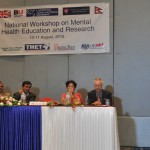On Thursday I took the opportunity to attend a seminar at the Wilson Centre run by the Maternal Health initiative (MHI). The MHI seminar series promotes dialogue and understanding among practitioners, scholars, community leaders, and policymakers with the aim of facilitating creative interventions that can be integrated into policies and programs worldwide. This month’s topic focused on the neglected issue of Perinatal Common Mental Health Disorders (PCMDs) in low- and middle-income countries (LMICs). 
Mental health concerns have remained largely absent in large-scale global maternal health programs, and the first speaker Prof Jane Fisher (Jean Hailes Professor of Women’s Health and Director Jean Hailes Research Unit School of Public Health & Preventive Medicine, Monash University) provided the background to the problem. Jane highlighted the damage done by work in the 1980s that suggested that women in LMICs were protected from perinatal mental disorders because of the traditional care practices after birth. The result of this misinformation has been a dearth of research in LMICs and a failure to recognise the impact that PCMDs may have on both maternal and perinatal morbidity and mortality. Jane presented data on the prevalence and determinants of mental health disorders in LMICs that indicated that they are a very real issue for women in LMICs. She called for universal programmes for all pregnant women and for maternal mental health to be included as an indicator within the proposed Sustainable Development Goals.
Prof Ricardo Araya (Professor Global Mental Health, London School of Hygiene and Tropical Medicine) presented data to support the global burden posed by mental health disorders. He highlighted that a lack of specialist human resources and a lack of funding were the biggest barriers to addressing the issue. Presenting his extensive work in this area, he highlighted how task shifting has been shown to be an effective mechanism of providing support for women. However, he warned of the burden that this was placing on already over-worked frontline health workers and called for the maternal health community to provide greater attention and resources to address this neglected area of maternal health.
The discussion focused on the importance of raising the profile of mental health within the global maternal health community and on how health care providers can be supported to deliver interventions in LMICs. In the Centre for Midwifery Maternal & Perinatal Health we recognise the need for work in both these areas – researchers at CMMPH are currently working on mental health training for maternal care providers in Nepal. For further information contact Edwin van Teijlingen.
You can download the MHI presentations and watch the video here: http://www.wilsoncenter.org/event/integrating-mental-health-maternal-health-programs
 Maternal mental health in Nepal ICM presentation
Maternal mental health in Nepal ICM presentation THET maternal mental health training in Kathmandu
THET maternal mental health training in Kathmandu Mental health project in Nepal highlighted in national media
Mental health project in Nepal highlighted in national media THET-funded mental health training dissemination in Kathmandu
THET-funded mental health training dissemination in Kathmandu










 Expand Your Impact: Collaboration and Networking Workshops for Researchers
Expand Your Impact: Collaboration and Networking Workshops for Researchers Visiting Prof. Sujan Marahatta presenting at BU
Visiting Prof. Sujan Marahatta presenting at BU 3C Event: Research Culture, Community & Can you Guess Who? Thursday 26 March 1-2pm
3C Event: Research Culture, Community & Can you Guess Who? Thursday 26 March 1-2pm UKCGE Recognised Research Supervision Programme: Deadline Approaching
UKCGE Recognised Research Supervision Programme: Deadline Approaching ECR Funding Open Call: Research Culture & Community Grant – Apply now
ECR Funding Open Call: Research Culture & Community Grant – Apply now ECR Funding Open Call: Research Culture & Community Grant – Application Deadline Friday 12 December
ECR Funding Open Call: Research Culture & Community Grant – Application Deadline Friday 12 December MSCA Postdoctoral Fellowships 2025 Call
MSCA Postdoctoral Fellowships 2025 Call ERC Advanced Grant 2025 Webinar
ERC Advanced Grant 2025 Webinar Update on UKRO services
Update on UKRO services European research project exploring use of ‘virtual twins’ to better manage metabolic associated fatty liver disease
European research project exploring use of ‘virtual twins’ to better manage metabolic associated fatty liver disease